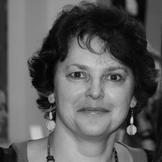Professor Mira Bergelson

School of Philology
Higher School of Economics, Moscow
Mira Bergelson is professor at the Faculty of Humanities, Higher School of Economics. Her research interests include linguistic aspects of communication, neurolinguistics, cross-cultural pragmatics, and narrative discourse. Professor Bergelson received her Ph.D. in linguistics from Russian Academy of Sciences for a grammar description of one African language (Bamana). Her second doctoral dissertation focused on the sociocultural pragmatics in language and discourse. Mira’s other fields of expertise are international education and communication. Her recent course Understanding Russians: Contexts of Intercultural Communication was one of the first three English-language courses offered by a Russian university on Coursera. Her professional experiences are very diverse with the focus on effective communication and importance of cultural knowledge, which lie in the heart of professional communication. Mira is a very culturally adaptable person. She has proven that having worked in such variety of settings as Russian academic institutions, American universities, a remote Siberian town, an Alaskan village, a US embassy, and the Kremlin press-office. Mira has been born and grew up in Moscow where she has always lived except for a few years of studies and research in the US and Germany. She considers herself bicultural and is fluent in Russian and English and speaks basic German and French. She has researched a variety of indigenous languages and cultures of Russia in the Caucasus, Eastern Siberia and Far East.
Cultural resistance and language loss in Alaska
In this linguistic project we have been documenting a unique and moribund variety of Russian – Alaskan Russian, and this goal demands full submersion in the ethnic, social, religious and thus - cultural history of the region. In our attempt to recreate the cultural universe in which this variant of Russian language emerged, developed and moved into oblivion, issues of methodology, causality and contingency, conscious choices and political processes are on the forefront. In this class we will discuss parameters that may determine the ways local cultures and languages interact and influence each other in the comparative.
